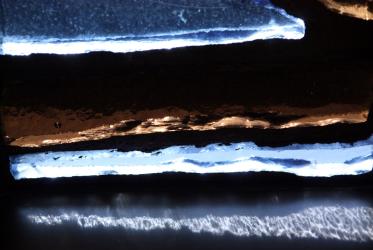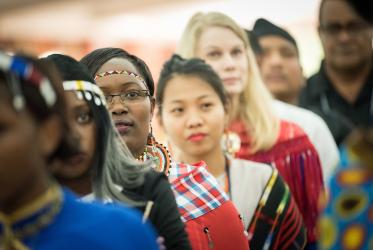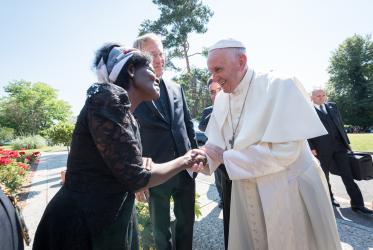Roman Catholic and World Council of Churches (WCC) representatives are forging new ways of working together on today’s most pressing issues.
The Joint Working Group (JWG) of the WCC and the Roman Catholic Church, held its latest annual meeting from 13 to 17 September at the Château de Bossey, Switzerland, is in its sixth decade, having been initiated in 1965.
The group monitors the collaboration of the two bodies in the areas of Faith and Order, mission and evangelism, justice and peace, ecumenical formation, and interreligious dialogue. The group has also jointly studied shared theological questions, such as reception of ecumenical work, and related social questions.
Increasingly JWG meetings advance not only the agenda of the working group itself but also the growing collaboration at the operational, programmatic level, with WCC programme staff working directly with Vatican dicasteries.
The JWG has decided to centre its work during this current, tenth phase on two specific areas: peacebuilding and dialogue in areas of conflict and the plight and prospects of migrants and refugees.
The areas align neatly with current missional priorities of Rome and the WCC’s pilgrimage of justice and peace.
In this iteration, the JWG, led by co-moderators Metropolitan Nifon of Târgoviște, of the Romanian Orthodox Church, and Archbishop Diarmuid Martin, the Primate of Ireland, is also exploring a new methodology, creating specific groups focused on the two main streams of its work.
The two groups are not simply to study the situations, said Archbishop Martin, but also to determine “what we can say to the parent bodies about opportunities for deepening engagement on these issues,” so that they will have real impact in the life of the church itself.
Said co-moderator Metropolitan Nifon, “In this way we hope not only to monitor the ecumenical collaboration of the churches at local and international levels, but also to encourage and recommend to our parent bodies, ways to facilitate its further development and evaluation."
Archbishop Martin echoed that affirmation: “The group was very pleased to note the level of working together between the offices of the WCC and their counterparts in the the dicasteries of the Roman Curia. The JWG's work in the coming years hopes to contribute towards a deepening of this ecumenical cooperation which is already underway.”
At the Bossey meeting, the newly formed groups also discussed the task, method and desired outcomes of their work together, for which co-coordinators of each (including a Roman Catholic and WCC representative) will be named this fall. The groups will also draw on staff resources and outside expertise.
The papacy of Pope Francis has enlivened the JWG’s mandate. A highlight of the meeting has been exploring the confluence of the WCC’s chief programmatic aegis, the Pilgrimage of Justice and Peace, with the central writings of Pope Francis, specifically his apostolic exhortations Evangelii Gaudium and Amoris Laetitia, as well as his 2015 encyclical Laudato Si'.
While not a member church of the WCC, the Roman Catholic Church is deeply involved in the programmes, commissions, and initiatives of the WCC.
Presentations by WCC associate general secretary Isabel Phiri and other WCC staff explained the origins, shape and current programmatic configuration of the pilgrimage and analyzed the shared commitments and convictions behind the pope’s writings and the pilgrimage, especially on meeting global economic and ecological challenges.
Other presentations detailed and analyzed collaborative efforts in the areas of Faith and Order, mission, interreligious dialogue, migrants and refugees, peacebuilding, and international affairs.
Archbishop Martin offered a critical reflection on the exhortation Amoris Laetitia and its uniquely pastoral approach to the social, ethical, and spiritual realities of families today.
An underlying theme frequently emphasized in the presentations was the crucial character of discernment. Discernment by individuals as well as churches is critical to fostering deep conversion to the needs of others that underpins ecclesial work for justice and peace, said presenter Rev. John Crossin, Oblates of St. Francis De Sale, of the United States Conference of Catholic Bishops.
WCC General Secretary Rev. Dr Olav Fykse Tveit sees the growing relationship between the Roman Catholic Church and the fellowship of churches of the WCC as a sign of hope, saying that hope is critical for people suffering in so many places the consequences of injustice, violence and war.
In his presentation to the JWG, Tveit shared with the group both the pain and encouraging experiences of new initiatives by churches, often in partnership with other faith communities, that he has seen in recent travels to Nigeria, Burundi, Brazil and the Middle East and of the efforts for peace in South Sudan.
In response to questions, Tveit underlined the importance of accompaniment and mutual accountability among the churches on their pilgrimage of justice and peace as an expression of the ecumenical movement: “The pilgrimage of justice and peace is a movement of hope that brings us to places where we can encounter each other on our journey and look for common understanding as human persons, as Christians, as churches.”
Tveit concluded, in view of the quality of relationships nurtured by the JWG, “May God bless your work because it is a blessing for us.”
The working group convened just as Christians around the world have been observing the annual World Day for Prayer for the Care of Creation, an ecumenical initiative of the Ecumenical Patriarch, Bartholomew, that has been embraced by Pope Francis and coincides with ecumenical participation in the monthlong ecumenical Season Creation. The morning and evening prayers of the group were built on these themes.
See the communique of the Joint Working Group
See the Ninth Report of the JWG and its work on youth, spirituality, and reception
Learn more about the Day of Prayer for Creation and the Time for Creation











